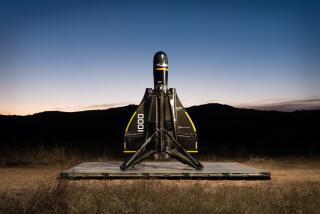Success of High-Tech Weaponry Boosts Outlook for More Production, Backers Say
WASHINGTON — The opening days of the war against Iraq have given a giant boost to U.S. “smart” weapons and are likely to prompt Congress to revamp the military budget to channel more funds toward such sophisticated weaponry, key Democrats said Sunday.
Dramatic film on television showing the Patriot air defense missile knocking down incoming Iraqi Scud missiles in Saudi Arabia and computer-guided bombs being delivered with pinpoint accuracy in Baghdad have impressed key members of Congress as well as the public.
As a result, supporters of the B-2 Stealth bomber have revived hopes for further production of that costly and controversial aircraft, which essentially had been put on hold during last autumn’s budget debate.
Backers of the Strategic Defense Initiative, popularly known as “Star Wars,” also said they expect renewed interest in its potential as part of a plan to develop a national system for defense against intercontinental ballistic missiles.
But the staggering costs of the war--estimated at between $1 billion and $2 billion a day--may prevent allocation of large additional sums for “smart” bombs and missiles in the near future, said Rep. Leon E. Panetta (D-Monterey), chairman of the House Budget Committee.
“We have to assume this war is going to produce increased pressure for higher defense expenditures overall,” Panetta said Sunday. “Smart weapons are going to be expensive, too. We’re not going back to the peace dividend.”
Congress is expected to approve a supplemental appropriations bill in late February or early March to make the first payment on the cost of deploying U.S. forces in the gulf and waging war against Iraq.
Even so, the obvious effectiveness of American planes, electronic countermeasures and Tomahawk and Cruise missiles in the first days of the war are bound to have an impact on congressional thinking about defense spending.
“One of the major results of this war will be the success of the high-tech weapons,” said Rep. Lee Hamilton (D-Ind.), an influential member of the House Foreign Affairs committee, in a television interview on NBC’s Meet the Press. “Congress will be more receptive now to these high-technology weapon systems.”
Similarly, Rep. Norman Dicks (D-Wash.), second-ranking member of the House defense appropriations subcommittee, said the televised display of how “smart” weapons actually work would overcome objections from critics that they were too high-priced and complicated.
“The case has been made for maintaining our technological edge,” Dicks said Sunday. “People are going to take a second look at the most advanced technology and that includes the B-2.”
Dicks said the good performance of “smart” weapons may help to reduce opposition to funding a ground-based system designed to defend against tactical ballistic missiles, but he doubted whether a space-based anti-missile program to defend the nation against an ICBM attack was feasible.
In another move to exploit the widespread enthusiasm about the Patriot’s ability to kill Iraq’s Scud missiles, a group of Republicans led by House Minority Whip Newt Gingrich (R-Ga.) disclosed plans to push for rapid development of a more sophisticated anti-missile system to be used against intercontinental ballistic missiles as well as the slow-moving Scud.
Some lawmakers, however, expressed skepticism about increases in spending for sophisticated weapons, preferring to delay decisions on higher outlays for “smart” weapons until more evidence becomes available on their limitations as well as their successes in the war against Iraq.
“Obviously, the technology is working and working very well,” said Sen. John Glenn (D-Ohio), “but it’s too early to make an assessment of where future defense dollars should be invested.”
“We really don’t know yet” whether to expand funding for high-tech weapons systems, said Rep. Martin Olav Sabo (D-Minn.). Sabo said Congress has reshaped Administration requests for several years to provide more funds for the type of conventional arms that have been successful in Iraq as opposed to such strategic systems as the MX missile and SDI.
Sen. Ted Stevens (R-Alaska), however, said the “Star Wars” concept should be revived as a result of the experience in Iraq with advanced technology.
“Anyone who sees the Patriot knock down Scuds ought to think twice about how SDI could knock down ICBMs,” Stevens said.
As for the possible impact on the battle over the Stealth bomber, Stevens alluded to the opening-day bombardment of military targets in Baghdad.
“The little Stealth (F-117) led the way--no question that it’s proved its utility,” he said. “In Panama, it was employed for psychological effect, but in Iraq it was used as it was intended to be used.”
More to Read
Inside the business of entertainment
The Wide Shot brings you news, analysis and insights on everything from streaming wars to production — and what it all means for the future.
You may occasionally receive promotional content from the Los Angeles Times.









